#watership down 2018
Text
Something to notice or maybe I'm the only crazy one who thought of it.
But doesn't it seem to you that Vervain and Orchis in the miniseries could have functioned as a sort of Anti-Hazel and Fiver?
Look at it this way, the two are the only sibling rabbits we've seen that at least stayed together for a long time (and well it makes sense that it's weird, rabbits aren't famous for their sibling relationships). You can tell they have a very strong and appreciative relationship with each other, we already know that about Hazel and Fiver. But in the case of Vervain and Orchis, we see that they both care for each other in a certain way. Vervain, a rabbit who we know was raised in Efrafa's cruel and harsh system shows respect and trust towards his brother. Then we see that despite not probing much further into it, after his death Orchis shows quite a lot of remorse and anger towards it, which makes it apparent that their appreciation was mutual and legitimate.
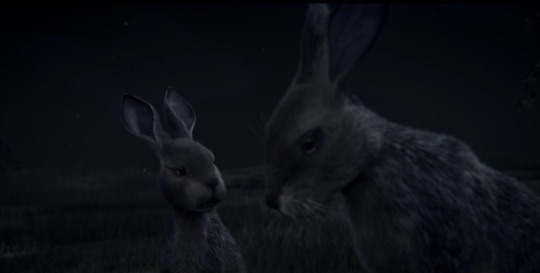
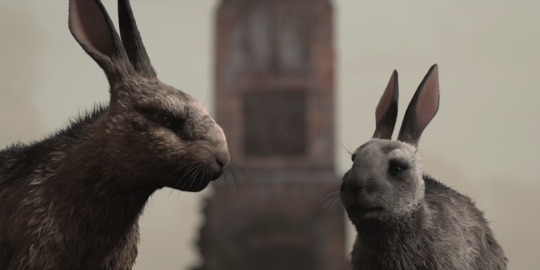
Now in terms of roles.
Vervain is a high ranking captain, he earned his position in full "right" due to his aggressiveness and harshness when dealing with other rabbits.
Hazel on the other hand is a "common" rabbit who slowly earned his position as chief after demonstrating his leadership and ability despite not being a particularly large or strong individual.
Hazel is compassionate and calm, Vervain is rough and aggressive.
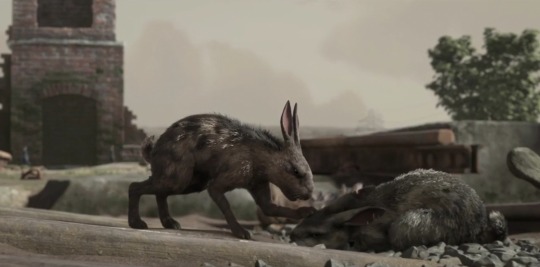
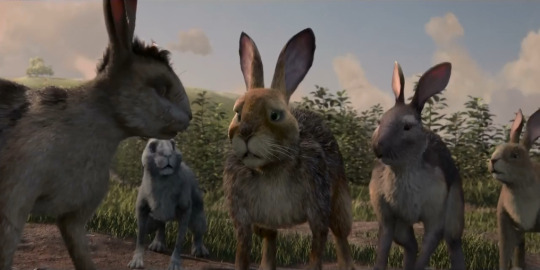
Then we have Orchis, who like Fiver stands out for being a thin and small rabbit, which leads them to be easily intimidated by larger rabbits.
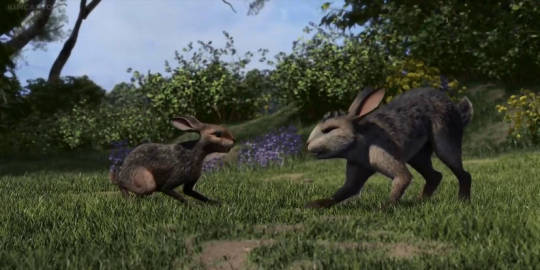
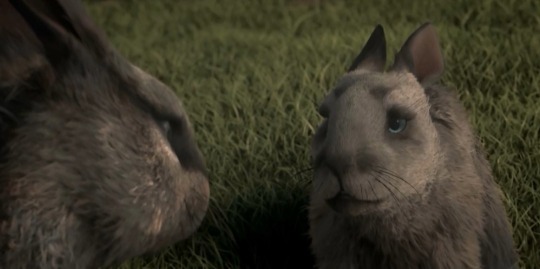
However, despite not having visions, both Orchis and Fiver prove to be able to overcome their physical weaknesses with intelligence.
Orchis is deceptive and cunning, Fiver has great reasoning, empathy and it's sincere.
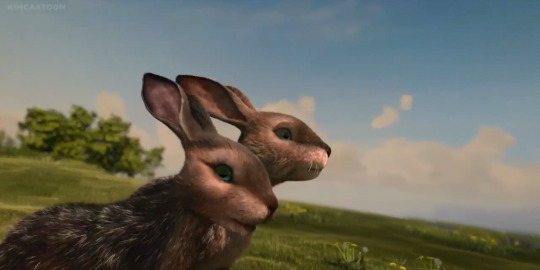
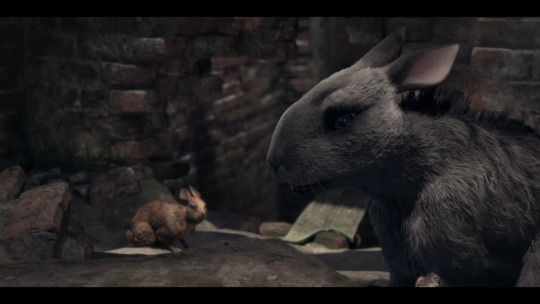
I don't know about you. There would be more to look at but I think this is the highlights.
#like this could had a lot of potential#watership down#lepur stupid thoughts#hazel#fiver#vervain#orchis#Watership Down miniseries#Watership Down 2018
53 notes
·
View notes
Text

blackavar
15 notes
·
View notes
Text
Just finished watching the 2018 Watership Down series
And ITS SO GOOD
I genuinely love all the characters so much akdjhfhfh
9 notes
·
View notes
Text
“He who thinks death is the gravest of punishments knows nothing of what is to suffer.” This show about rabbits sure has some raw ass lines
22 notes
·
View notes
Text
Orchis is horrible, I want to hold him in the air with both hands without supporting his bum and squeeze him a little too tight.

#go online. infantilize a minor villain. don't elaborate. leave.#.txt#shitpost#mine arte#Watership Down#watership down 2018#Captain Orchis
25 notes
·
View notes
Text
Shout out to Strawberry, you funky little transfem bisexual
#yeti speaks#for context strawberry was male in the book but female in the 2018 version#so that obviously means that she's trans /hj /lh#watership down#watership down 2018#richard adams#strawberry wsd#lgbtqia+#trans#transgender#transfem#bi#bisexual
18 notes
·
View notes
Text
People who try to claim that the first movie adaptation of a book is the 'original' and any other adaptations, movie or show, are CLEARLY trying to replicate the 'original', even though the other adaptations are very obviously basing itself off of the book and not the first adaptation, are my ENEMY.
#watership down#i cant think of any more examples#yes this is based off of that one video by the youtuber with the character that has black hair and gray hoodie#-who compared the 1978 film adaptation of watership down with the 2018 series and never mentioned the book ONCE-#-EVEN THOUGH MOST OF THE DIFFERENCES BETWEEN THEM WERE BECAUSE OF THE 2018 SERIES HAD MORE BOOK CONTENT IN IT!
17 notes
·
View notes
Text

thinking abt tron w this watership down quote
#tron#tronblr#cii speaks#specifically i’m picturing pre/post 82 tron being told this my alan#<- the fact that it’s basically a god warning his creation also helps this#watership down posting for the first time in like. seven years LMAO#2018 me would be proud
8 notes
·
View notes
Text
Half of the things the book version of Bluebell says make it seem like Richard Adams inadvertently predicted the tone and vibes of tumblr fandom shitposts decades before they became a thing. I’m just saying, someone suggesting that the Watership Down rabbits could deal with their cat problem by either eating the cats or taking them as mates and having babies with them to get powerful cabbit kittens sounds like something a college kid making edgy jokes about kids’ media would say. All of this makes sense when you figure Bluebell is SUPPOSED to feel like the rabbit equivalent of of a scared 20-something who’s coping with Dadaist humor.
#this shows that even in his 50's adams had a good feel for writing young people#I haven't properly watched the 2018 miniseries idk how they handle in bluebell there#watership down#richard adams#bluebell#bluebell watership down#sandleford warren#watership down warren#humor#tumblr#tumblr shitposts#millennial humor#zoomer humor#internet jokes#meta#literature#children's literature
21 notes
·
View notes
Text
End of month update - March (+ April 1st)
Hello, all! Sorry that this update is a day late, I didn't get around to posting it yesterday.
This is the end-of-month update, where I post Tumblr’s current top four films that have received the highest percentage of “yes,” “no,” and “haven’t even heard of this movie” votes.
As of today, the top four films with the highest percentage of “yes” votes are:
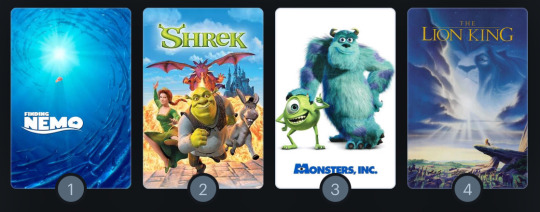
Finding Nemo (2003) | Shrek (2001) | Monsters, Inc. (2001) | The Lion King (1994)
Next, the top four films with the highest percentage of “no” votes are:
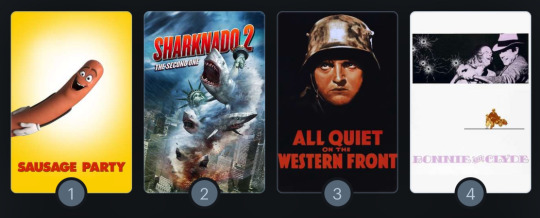
Sausage Party (2016) | Sharknado 2: The Second One (2014) | All Quiet on the Western Front (1930) | Bonnie and Clyde (1967)
This top four changed through the new additions of Sausage Party (2016) and All Quiet on the Western Front (1930), which replaced Sharknado 3: Oh Hell No! (2015) and Scarface (1983).
Finally, the top four films with the highest percentage of “haven’t even heard of this movie” votes are:

Monica and Friends: Bonds (2019) | Monsturd (2003) | Heroic Losers (2019) | Death Trance (2005)
This top four changed through the new additions of Monsturd (2003) and Death Trance (2005), which replaced Mahana (2016) and Capernaum (2018)
Currently, The Incredibles (2004) is the still only film to receive absolutely zero “haven’t heard of this” votes.
That’s it for March’s end-of-month update! Remember that you can view last month’s update by clicking here. Additionally, you can view the full ranked Letterboxd lists of movies that have come up on this blog by clicking the following links:
This list is ranked from highest-to-lowest percentage of “yes” votes.
This list is ranked from highest-to-lowest percentage of “no” votes.
This list is ranked from highest-to-lowest percentage of “haven’t even heard of this movie” votes.
Remember to vote on the polls that are currently running:
Jane Eyre (2011) | Lady Macbeth (2016) | The Water Diviner (2014) | Thoroughbreds (2017) | Suspiria (2018) | Closely Watched Trains (1966) | Atonement (2007) | The Official Story (1985) | Fright Night (1985) | Ernest & Celestine (2012) | Central Station (1998) | The Hitcher (1986) | The Company of Wolves (1984) | Predestination (2014) | Lemony Snicket's A Series of Unfortunate Events (2004) | This Is England (2006) | Crimson Peak (2015) | The Love Witch (2016) | Lost in Translation (2003) | Romeo + Juliet (1996) | Santa Claus (1959) | Tokyo Drifter (1966) | A Fistful of Dollars (1964) | Brain Damage (1988) | Society (1989) | Watership Down (1978) | Frankenhooker (1990) | Mars Attacks! (1996) | Super 8 (2011) | Goosebumps (2015) | Goncharov (1973) | The Hunchback of Notre Dame (1996) | The Secret of Moonacre (2008) | Coraline (2009) | The Nightmare Before Christmas (1993)
85 notes
·
View notes
Text
I know that the WSD miniseries have a lot of lacks. But at least
Can we appreciate the shadow puppets El-ahrairah story?
I really liked the art there, looks so mystical.






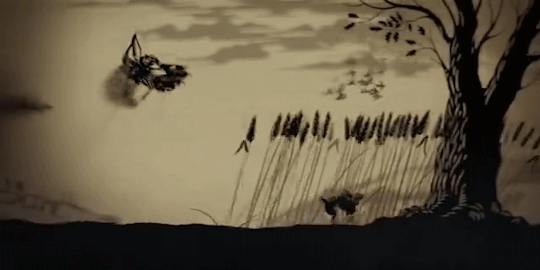
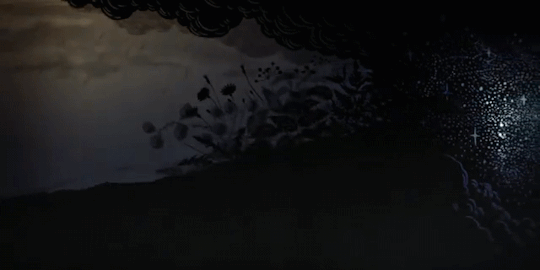
#watership down#watershipdown#wsd#of course the movie one with that tribal style is insuperable#but this looks charming#i pay for more rabbit folklore with these style#rabbit#animal#cartoon#bunny#elahrairah#el ahrairah#el-ahrairah#frith#elil#watership down bbc#watership down 2018#watership down miniseries#miniseries#netflix#netflix miniseries#bbc miniseries#watership down netflix#i forget to mention that the music is 👌👌#another hit post wooooh!!!
420 notes
·
View notes
Note
hi!! do you think you could maybe do a stimboard for Fiver from Watership Down (2018)? with soft stims preferably, ty!! :3
here you go!!









Fiver from Watership Down (2018) stimboard
🧸🐰🍃 | 🧸🐰🍃 | 🧸🐰🍃
🧸🐰🍃 | 🧸🐰🍃 | 🧸🐰🍃
🧸🐰🍃 | 🧸🐰🍃 | 🧸🐰🍃
☆ Requests: Open ☆

#age regression#pet regressor#petre blog#sfw agere#age regressor#pet regression#petre#animals#autistic stimming#stimboard#bunny stim
53 notes
·
View notes
Text
I really miss that we don't have many darker animal xenofiction movies/series coming out these days. I miss stuff like The Secret of NIMH, Plague Dogs, Watership Down, Animals of Farthing Wood, Felidae, etc.
Closest we've gotten in the past decade and a half is like...Guardians of Ga'Hoole movie and the 2018 WSD series? I can't think of any others
18 notes
·
View notes
Text
Rewatching Watership Down 2018 and I love how Bigwig just wins every Speech check.
6 notes
·
View notes
Text
I really like reading books, so here are some books that have read this year with a sentence or two (or more lol) on personal thoughts about them. There is another list of books read up to a certain point this year, please click here to read and scroll down to half the page: https://ranfren.neocities.org/log/log8/log8.html
Tender is the Flesh by Agustina Bazterrica (fiction, 2017):
A metaphor about corporations and corruption and how they will still want to make money regardless of morality, even influencing consumers to change their viewpoints
of morality overtime to benefit them regardless of how inhumane it is.
A gritty story that's not fun to read exactly, but glad it exists (hopefully this never happens in reality. My meat won't taste good.).
Bambi by Felix Salten (fiction, 1923):
Blood, blood, blood. Didn't expect this much blood. A character who at the beginning thought dead comes back and is killed
for real. A lot of death. Description of intestines pooling out. The movie everyone remembers
as the mother dying as the saddest part, but in the book that doesn't happen the same way. Instead Bambi's mother to make him more independent overtime starts disappearing to distance herself from him, which made me feel more sad than the movie depiction. Man/Human is also seen in the flesh in this
book, and I liked the way that the author wrote from the viewpoint of a deer who had never seen a human before try to understand what he was even looking at (Felix has made me realize that we are the true cryptids of the animal kingdom.)
The part where man also mimicked the deer's voice using the deer whistle was unsettling, and Bambi 2
the movie by Disney actually adapts this scene that wasn't present in the original movie.
The message of the book is that you must live life alone, and even if you try to avoid that, we all
die alone in the end. But its not in a sad way exactly, but on a more realistic viewpoint of having
to get used to living on your own. Watership Down on acid.
Ring #1 by Koji Suzuki (fiction, 1991):
The original novel that the movies were based on. The scariest part was at the beginning when the victims who watched the tape died. The book is more of a mystery and trying to unsolved the mystery of the tape and its origins and how to stop the curse with the protagonists caught in the cycle by accident, and is more of a mystery overall than a horror. Somehow I can resonate with Sadako's intentions and disdain for humanity, but I would never create a curse such as this.
Sadako Yamamura's sexual and gender identity is removed entirely in the English movie adaption, even though it is a big part of why the curse is created. (Umineko has a character that is kind of similar to Sadako when I now realize it when it comes to this)
Once a Bitcoin Miner; Scandal and Turmoil in the Cryptocurrency Wild West by Ethan Lou (non-fiction, autobiographical, 2021, canadian):
Wanted to read more about bitcoin and the obsession over it.
The author is someone from and lives in Canada so it also was a deciding factor compared to other books.
It does read as you think it does. (Dividing the chapters into Acts, and one called Intermission: NORTH KOREA, made me laugh, I'm sorry xD). It was a "bit of a slog" ・ω・ to finish it, but I am glad to have read about a personal experience of going through the strange world
of cryptocurrency and their fanatics. USA is also even more of a scary country than I thought in regards in how they treat their citizens in regards to some things (In this case its the fbi deeming someone who may be "inspiring to strengthen ""THE ENEMY"" [???] The Fbi is scary).
Give People Money by Annie Lowrey (non-fiction, social economics, 2018):
Picked up this book after seeing it several times on the shelf at
the library and it really stands out. It's a good title. Goes over how giving everyone a chance to
actually participate in the economy would only benefit all, as well as removing the need for anxiety over housing and food and basic needs will bring out all of the entrepreneurs and business-like minded people who cannot or do not have the time and energy to truly develop themselves. It didn't bring up too many
arguments from the other end really except for the common ones you hear that can be easily countered "
everyone will be lazy and not want to work!" and not something more like, would people then try to enslave
others for their ubi to give them more money? Would landlords raise more rent because of an ubi (in this case there would have to be laws made to go against unnecessary greed, and possibly do away with landlords as a concept in general). But I didn't really expect the book to go over these and more of the benefits of giving everyone a livable income every month regardless of how "useful" they are to society as a basic human right to alleviate suffering that is caused by today's set up. (the internet already is a case example of people using their skills and labour for free for the benefit of all regardless of monetary gains, people want to make and share things to improve other people's life, they're not just going to "do nothing".)
Digital Minimalism by Cal Newport (2019. non-fiction, self-help): Going over the benefits of limiting your time online consciously and
minimizing your time on social media in particular to be able to clear your mind and have less intrusive and outside thoughts and to concentrate on your own work and hobbies.
Hello, Habits by Fumio Sasaki (non-fiction, 2018): Had read this author's first book, "Goodbye Things" a few years ago, along
with Marie Kondo's book, and I enjoyed the author's documentation of going from a 'clutterbug' to a person with little to no belongings except for what truly matters to him. I liked how there was pictures in colour as well showing the before and after.
In regards to Hello, Habits, there is probably not a lot of tips
that are going to stay ingrained in my head; so far the part I even remember the most is when the author stated that the Japanese Government states that "having more than 7 hours of free time a day is going to lead to more bouts of depression", which is funny considering that's the same length of time for average work hours. (I wouldn't trust much with what the Japanese Government thinks is good for people, considering how everyone has their own basic needs and this isn't going to work for everyone and is more for their own benefits than the people's ・ω・). The author states this will probably be his last self-help book, but does plan to write his next book about how he stopped drinking, so I am looking forward to that!
Sanshiro by Natsume Soseki (fiction, 1908):
A classic story that takes place during the early 1900's in Japan when a lot of change was happening culturally and within the university cultures. Following a young man from the country who moves to the city to study, and all of the cultural shock and differences he experiences is interesting as it feels like you're experiencing it yourself. The professor character is very enigmatic and quite nihilistic about where Japan is headed and national pride overall is meaningless. The depiction of how women are perceived and the changes that's happening is interesting as well, as women become more individual and more vocal about their control over what they want in life, and how other people reflect on that. I still want
to read "I am a Cat" by the author.
The Amityville Horror by Jay Anson (non-fiction (it classifies itself as that), 1977): I got this book for free when I was at a people's house out in the country side who were moving and didn't want any of these books, so it was a good score. The book differs
heavily from the movie in terms of what events happen when and where. The use of exclamation points was over-utilized; I was thinking, "Does this sentence need an exclamation mark, too? It's bringing me out of the "horror", lol." The parts with the marching band at night being heard was eerie,
and you can feel the character being drove nuts by the experience of it. It was a good book to read on the road trip. I did like the ending after part of the story about the nature of demons and how they will possess people to want to really take advantage of this realm to be able to drink and party and have fun….
Norweigan Wood by Haruki Murakami (fiction, 1987): Had been wanting to read this forever, as it was the book that gave this
author the first big-scale recognition he didn't have previously. Although it was surprising to see how much
more "normal" it was considering the rest of the works I have read from the author, which usually have portrayals
of surreal and dream-like spaces in reality and characters, this one is more realistic and set without strange happenings.
However I am still in doubt about one of the characters, due to events that happen earlier in the book with how some characters
recount their experiences.
This book feels like a visual novel where the main character has different routes he can choose for girls but as a Murakami novel.
Stoner by John Williams (fiction, 1965): The story of a person from the countryside who enters and lives through the academia world for the rest of his life afterwards. There is a lot of drama that happens to him throughout the book, even though he's a very inconspicuous person who is really only interested in knowledge and having a simple life, and only doing what he believes is right. The ending made me shed some tears. Even though this book is known as being very sad or depressing because of the main character's life, I have to agree with the author that this character's life wasn't actually all that bad (it's better than a lot of people's).
21 Lessons for the 21st Century by Yuval Noah Harari (non-fiction, 2018): After the more depressing outlooks displayed in Homo Deus and Sapiens, this book went over things we can do to change our situation and go to a better future for everyone. It still had some parts that made me freeze and then feel (badly) nihilistic again when it went over technology, but I am glad that it ended on not a completely hopeless an bleak note.
Brief Answers to the Big Questions by Stephen Hawking (non-fiction, 2018):
The last book that was released before he died. In the most simplest manner as possible for someone has involved as he was, he goes over simple questions that everyone has at some point on their life and answers them in with regards of
his knowledge of metaphysical physics and as much of the universe and the laws of reality that we know up to this point. The ending part also made me cry a bit, with saying to always look up and never stop doing what you are meant to do.
Homo Deus by Yuval Noah Harari (non-fiction, 2015): This book covered more about technology and human society and how they are intertwined. It covered also about how if and when artificial intelligence will eventually need "basic rights" as they will be sentient, and thus know about pain and suffering and joy, and how that will also impact human species as a whole and our relationship to this new species. I do wonder if eventually humans will be replaced by AI, who will probably call themselves something else down the road, and if that is just how nature works, since humans didn't always exist either.
The Te of Piglet by Bejamin Hoff (non-fiction, spirituality, 1992): Read this book because liked the author's original book, but this one takes a lot of what I didn't like about the first book which
was the random rants that would appear on the author's part, and made that part this book lol. I don't think that technology and spirituality have to be separated to the point you hate technology, because humans made technology to enhance our lives. The book is also interesting as a product of its times when it was writing about how microwaves are dangerous and that the government is lying in some way saying its okay only for benefit. Well I don't really remember much parts with Piglet in it.
Books written before the internet was in wide-spread use is interesting to read for that alone.
The Wasp Factory by Iain Banks (fiction, 1984): I loved this book lol. I read it as I saw it at the library in the countryside because anytime there was a list somewhere on "most disturbing
books", this one was usually on it. And knowing it had animal cruelty in it, I am surprised that cats were not involved, whether that was the author's intention or not, I almost
have to give a credit to that. I am glad to have figured out "the mystery" half-way through, because that doesn't always happen. I really like this first-person storytelling about a person
who doesn't officially exist, and is raised in a very specific manner different from other humans, intentionally. So I think how a person would be like regarding this way of growing up,
the author portrayed that well. The lesson here as well is that, with just a single truth, to knowing who you are, a reality-shock, can change everything you ever thought about how
reality actually is or isn't. Just one word and truth is all it takes.
Peril at End House by Agatha Christie (fiction, 1932): A short mystery story amongst the hundreds created by Agatha Christie, and featuring a character that was the inspiration for the character
Erika Furudo from Umineko no Naku Koro ni Chiru. I didn't know of that when I first started reading it, but I was able to tell once this detective character started speaking about stimulating his "little grey cells", and is a Frenchman or at least speaks french and adds in random french to his sentences, as Erika injects random English words into her Japanese.
As usual in this author's books, I didn't figure out the culprit until after they revealed it to the reader.
Colorless Tsukuru Tazaki by Haruki Murakami (fiction, 2013): The story of a young man with very close friends who after a summer finds out that they're all avoiding him and doesn't want to be his
friend anymore, and he is unclear as to why, so as he grows up, he tries to solve the mystery. Murakami writes his female characters in a very weird way yet again, and when talking dirty to the MC,
its like kids talking about sex but they have no idea what they're talking about. If I want to be positive or something, maybe it just adds to the surreal-ness of it all. Unlike Norwegian Wood, this
book has events that can only be explained by supernatural occurrences. I think the feeling of losing your very close friends unpredictably is something that drew me to this book, because its a very awful thing to go through if you have had it happened to yourself, as it has happened to me.
Scattered All Over the Earth by Yoko Tawada (fiction, 2018): In this alternate timeline Japan has disappeared from the earth, but people still vaguely remember it, and there are Japanese people who live around the world trying to find others from the country that no longer exists. It was an interesting tale of linguistics especially and how they were used and how language can be altered or changed for survival and communication purposes. I had read the book from this author which was similar but it was about Japan closing itself off again from the world instead of disappearing, like how it did earlier in History in regards to Western importation and influences. I think I still like "the Emissary" more, because of it having themes of biological defects and changes and some more weird things as opposed to just one concept really. For example in that book, the old people keep on living older and older but can still physically work, while new people being born are aging and dying much faster than the "old" humans. Yeah that's just one crazy part of why I liked that book more than this one.
But that's a very personal thing. ( ・ω・ )
Heart of Darkness by Joseph Conrad (fiction, classic, 1899): A classic that is urged to read at least once in your life. I remember more about the introduction of learning that the author was from Ukraine (specifically Berdychiv, Russian Empire) and also didn't start learning English until around his 20's, and ended up being a very prolific English writer. His father Apollo was a political activist against the Russian Empire and the other empires vying control over territory of the time, which makes me realize how long these issues have been going on for.
The book made me feel empty in that how people did treat others and still do because of a special commodity that can only be found in those people's homelands, and brutally taking advantage of them because of that fact. Just to make more people have wealth and rich that don't even live in those places. The graphic scenes and ways that locals even conspire with the men from Britain
against other locals is sad too, but there are people who see opportunity and will take it if it means benefiting them but making another suffer. The trade off between "having a good life means someone else has a bad life or will result in an
early death". I remember the scenes of the heads on the sticks.
The Tao of Pooh by Bejamin Hoff (non-fiction, spirituality, 1990) : Saw this at the library and was curious because usually there is a lot more books on Buddhism and the different sects than there are for Taoism, and this book is supposed to be an introductory for that using Winnie the Pooh characters. A lot of characters from the original book do fit in with a lot of Taoism teachings I see, but these characters people have also found resemble other themes like different types of mental illness. ・ω・
It was this book and one of the books by Yuval Noah Harari that I learned that gunpowder was created by Taoists trying to create the elixir of life and having failed, the Imperial Dynasty of China at the time used the gunpowder instead for fireworks
and for fun for a very long time before it was even used as an accessory to weapons.
There are anti-science parts of the book that I wish could've just been left out, as it distracted from the feeling and tone of the book overall and what was expected of it.
There are parts about humans living forever or at least long times before government and technology intervened in the natural powers of people and such, but I think the author doesn't really understand how cell division works.
I did learn about some life lessons from Taoist ideology though, and I think this book is okay as a starting point for people who have no idea what its about as Buddhism is more overtly represented on shelves.
How to Read a Book; The Classic Guide to Intelligent Reading by Mortimer J Adler and Charles Van Doren (Non-fiction, 1940,):
The book title usually makes people laugh, but it goes insanely in depth on how the best you can get out of nonfiction and analytical books especially. It does cover fiction, such as knowing and learning how to speed read a book once and
then going over it again more steadily so you more fully understand the themes and messages the book is trying to give to you.
It also is a guide for helping to understand any kind of hard book that you are trying to learn from, such as philosophy books, theories and maths and science texts.
In itself the book took a while because it was very intense that it was a real mental workout in itself to get through lol.
The biggest thing I think I took from it was understanding when and where to speed-read during a text and when to go over it more carefully, and varying your reading speed throughout a work instead of just reading at one speed throughout changes how you tackle any kind of book now. It also teaches you how reading the front and back covers and inside flaps, along with the table of contents, will determine better what kind of books you want to take time out of your day to actually spend on, since
especially the table of contents is something that is very foretelling of what you will get out of this book in the end. As straightforward as that sounds, not everyone does this, and it urges you to be proactive by going over the table of contents first and foremost. Another example of this book is the advice of when reading fiction, the "bigger the longer the better (more immersion)", and reading all in one sitting if you can or as in as limited as possible to quickly and more deeply to recall and understand the themes and motifs happening throughout the story. The more fragmented approach you take with fiction, it will also fragment the overall experience, since if you read it in more long sittings, you will recognize those symbols and meanings much better and you are at more exposure.
The Brainwashing of My Dad by Jen Senko (non-fiction, autobiographical, 2021): This book caught my attention right away because of someone I know who has a parent that is deep into fox news and has to watch it everyday, even though we don't live in America, the parent of topic is more interested in what is going on over there than here, and seeing how someone had written a book on their own experience with their dad over the programming and more people becoming more upfront about it, this was a must-read for me. It goes over the history of Fox news, why it was created and its intentions, and how Republican-voters were overall mentally between before the program was created and after and how that political intensity and divide has changed otherwise soft-natured people into people turned onto rage. It detailed the differences of the author's dad when he would watch it daily, and then to the point in his life when he was hospitalized and never could access it anymore, and after his wife going through his emails and removing him from a lot of out lash-media, he reverted back into the kind person he once was ・ω・, somewhat telling of how outside influences that are not your own thoughts change you as a person, and that as your environment changes and not being exposed to certain things will let you create your own thoughts and views of reality once again.
You are Not a Gadget by Jaron Lanier (non-fiction, autobiographical, 2010): This book goes over virtual reality and the complications it has with human nature. As this author was one of the fore creators of VR back in the 80s, it's always interesting to hear their takes on then and now.
It was a book I don't remember much, as I think of this Author I tend to think of the first book I read by him called "10 arguments to Deleting your Social Media Accounts right now". Anyone who invents something that changes human society will have some thoughts or regret to what they have made and released,
even if that was rarely even their intention, as most technological inventors cannot think or see too far into the future of what social impacts their technology will change, better and worse, but usually are more focused on making their ideas come into physical reality. After years of seeing domino-effects as a result of their work, then they can see and comment on it. People who have worked at google and Ai and big data and have created inventions for them have been coming out in recent years over the effects these technologies are having and how to either work with them for your best interests, or substitutes instead,
even if they were the ones who created it to begin with.
Sapiens by Yuval Noah Harari (non-fiction, 2011): If there is any of the books to read by this author, it is this one. It goes over the history of humanity in a simplified by still in depth look of how things operate and how we got here. The most depressing of the books, and also the most eye-opening.
I can see how spiritual and religious people will feel very conflicted from what they would read in this book, but I think everyone should read it.
This book marks on how science is also a type of religion, and how nothing is exactly real, just human invention, but not the natural result of the world. However, I believe that we are still one and with nature, and if nature didn't want us doing these things, then it wouldn't have let us get this far. I don't think enough people think of us as being a part of nature and everything enough, and trying hard to convince ourselves that we are "separate" from that order, even though we have instincts and desires we can't even know or control where they come from.
I think that that does scary and make people think life and us are not as special (we are) as we are taught to be, but this book goes in without any comfort.
Corporations, money, identities, fiction, movies, gods, religion and so on are all things that technically don't exist, but humans make them exist to act as symbols to uphold society and order and to even be able to communicate over far distances, which any other animal cannot do or do the same way as us. This is what makes humans so special, so dangerous, and the smartest animal on the planet and in history.
The ability to be able to communicate about future or past events, to others in our species, in person or instantaneously over the internet, has made us the number one in the animal kingdom on Earth. And it is unfortunate as other animals have been wiped out since they cannot even hope to gain these skills quick enough to adapt or gain these skills, and hence the millions that have been wiped out since Sapiens has roamed the earth.
Symbols, things that don't exist or make sense to other animals (you cannot teach an animal something that doesn't exist like the concepts of ghosts or gods, they cannot even think of something that isn't something they can interact with in reality), are what give humans the ability to communicate with each other and bond whereas they wouldn't be able to. Two humans who have never met can share and bond because of a show or something they have both witnessed, and can talk about. This is why I think and believe things like cults, religion and their worshipers and fanatics, and fiction (and their fans, fandom, fanatics, and regulars/worshipers) are all one and the same in their basis of human communication and connection without having to learn about the other person without it. For example as well, we think of corporations a lot as if they were real people (Twitter™ did this, Apple® did that!), but they only exist because humans have to continually socialize with one another to keep its reality in the human collective consciousness.
That is also why things like money have to be kept in circulation and talked about, because the people who rely on money and the things they get from it, will cease or maybe people will think of better solutions to it, henceforth becoming it obsolete, but people who have invested a lot of mental and thinking power into the concept of money cannot lose all that time they've devoted, so they're the ones the most to suffer, like a cult member having to rationalize all the money and time they've put into a cult to avoid sunken cost fallacy.
There is a lot more to say, but this book can do a better job at it.
・ ω ・
My Neighbour Totoro by Tsugiko Kubo, Hayao Miyazaki (illustrations) (fiction, children's, 1988): I liked the changes that did happen in this book, even though I wasn't really expecting them somehow. Shows a bit more from other characters or they get more appearances, like the boy next door. This book was easy to get immersed in and hard
to put down, and really felt like was experiencing the Japanese Country side of the 50s. The father seems more into his professional work in the book compared to the movie, that the oldest daughter gets annoyed by it, for they feel they are being somewhat neglected.
I think anyone who loved the movie and has seen it a bunch of times such as myself will also greatly enjoy this novel version, for it has enough minor differences that don't feel like it changes the overall story too much, and isn't too much of the same thing as the movie.
Wabi-Sabi; the Wisdom of Imperfection by Nobuo Suzuki (non-fiction, spirituality, 2021): Some more insights into this particular way of life that's in Zen Buddhism. It's term is about accepting imperfections as they are and delighting in them, as nature itself is not perfect either, so why should humans suffer to try and obtain perfection, which is a concept that doesn't truly exist.
The drawing style of Heta-Uma reminds me a lot of Wabi-Sabi concepts. Nature viewing and walks and overall relationship with reality and nature are also enhanced when you have wabi sabi knowledge and practice it regularly.
The Doors of Perception and Heaven and Hell by Aldous Huxley (non-fiction, autobiographical, 1956): I know of this author because of having read Brave New World, which came out many years before 1984 did, and I find it being more closer in relation to our society now than 1984 is.
In this book the author recounts his experiments with doctors on the uses of mescaline and psychedelics and the results of using them. Mescaline is extracted from the cacti in which it originates from and used by native peoples of Western Mexico. Huxley couldn't believe it when he went and saw that they had used it everyday as part of their daily life, while taking a month break at times for resetting their tolerance to it, and not having any interruptions on their way of life while on their break and were able to resume again after. Some of his results were how his perception of everyday things changed, such as chairs (do chairs really exist? or are they too just symbols that man has made, as they are not actually chairs, but a bunch of wood assembled together), and things that he otherwise didn't care about, like the details of clothing and fabrics, and was fascinated with the construction of them. And they have been this way all along, its just that his perception has changed.
I'd recommend reading Brave New World before this however, since I think it is only really interesting to read once you have read this author's other works, especially BNW.
・ω・
I hope that if you were thinking of reading again, or haven't known what to read, that this helps inspire you to check something out, even if its not on this list, because there are so many books to read and learn from xD
Happy reading~ '・ω・
#sorry if some of this doesn't make sense xD#I feel like that monkey in that gif that's on the computer right now
215 notes
·
View notes
Note
Wait there were / are Watership Down figurines!?
Yes, theres plenty! Theres these ones by Royal Orleans for the movie

and then theres some for the tv series

There were these unreleased ones for the 2018 series by Nemesis Now

And the extremely elusive polyresin figures from the world of watership down magazine. we don't know if these were ever sent out to anyone, as the magazine suffered from such low sales it was cancelled after issue 5. (no shirts seen in the wild either, but ive seen the watch a few times)

117 notes
·
View notes